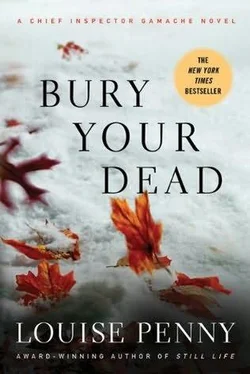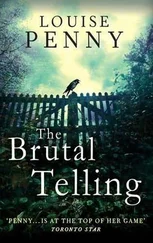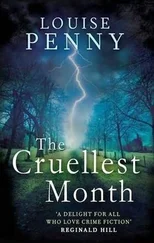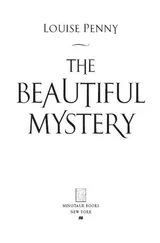Louise Penny - Bury Your Dead
Здесь есть возможность читать онлайн «Louise Penny - Bury Your Dead» весь текст электронной книги совершенно бесплатно (целиком полную версию без сокращений). В некоторых случаях можно слушать аудио, скачать через торрент в формате fb2 и присутствует краткое содержание. Жанр: Старинная литература. Описание произведения, (предисловие) а так же отзывы посетителей доступны на портале библиотеки ЛибКат.
- Название:Bury Your Dead
- Автор:
- Жанр:
- Год:неизвестен
- ISBN:нет данных
- Рейтинг книги:4 / 5. Голосов: 1
-
Избранное:Добавить в избранное
- Отзывы:
-
Ваша оценка:
- 80
- 1
- 2
- 3
- 4
- 5
Bury Your Dead: краткое содержание, описание и аннотация
Предлагаем к чтению аннотацию, описание, краткое содержание или предисловие (зависит от того, что написал сам автор книги «Bury Your Dead»). Если вы не нашли необходимую информацию о книге — напишите в комментариях, мы постараемся отыскать её.
Bury Your Dead — читать онлайн бесплатно полную книгу (весь текст) целиком
Ниже представлен текст книги, разбитый по страницам. Система сохранения места последней прочитанной страницы, позволяет с удобством читать онлайн бесплатно книгу «Bury Your Dead», без необходимости каждый раз заново искать на чём Вы остановились. Поставьте закладку, и сможете в любой момент перейти на страницу, на которой закончили чтение.
Интервал:
Закладка:
English people.
To his right sat his assistant, taking notes. On his left sat a man he’d only seen at a distance before today. Heard lecture. Seen on television. At trials, at public hearings, on talk shows. And at the funerals, six weeks ago. Close up, Chief Inspector Gamache looked different. Langlois had only ever seen him in a suit, with his trim moustache. Now the man was not only wearing a cardigan, and corduroys, but also a beard. Shot with gray. And a scar above his left temple.
“Alors,” Langlois started. “Before the first one comes in I want to go over what we know so far.”
“The victim,” his assistant read from his notebook, “is identified as Augustin Renaud. Seventy-two years of age. His next of kin has been notified, an ex-wife. No children. She’ll formally identify him later, but there’s no doubt. His driver’s license and health card both identify him. Also in his wallet was forty-five dollars and there was a further three dollars and twenty-two cents change in his pockets. When the body was removed we found another twenty-eight cents beneath him, fallen from his pocket we think. They’re modern coins. All Canadian.”
“Good,” said Langlois. “Go on.”
Beside him Chief Inspector Gamache listened, one hand holding the other on the table.
“We found a satchel underneath the body. Inside was a map of Québec, hand-drawn by him.”
It was on the table in front of them. The map showed areas of the city he’d excavated for Champlain, and the dates, going back decades.
“Any ideas?” Langlois asked Gamache as all three men examined the paper.
“I find this significant.” The Chief’s finger hovered over a blank spot on the map. A map that only acknowledged buildings and streets significant to Renaud’s search. Places Samuel de Champlain might have been buried. It showed the Basilica, it showed the Café Buade, it showed assorted restaurants and homes unfortunate enough to be targeted by Renaud.
It was as though the rest of the magnificent old city didn’t exist for Augustin Renaud.
And where Gamache’s finger pointed was the Literary and Historical Society. Missing. Not plotted. Not in existence in Renaud’s Champlain-centric world.
Langlois nodded. “I’d seen that too. Maybe he just didn’t have time to put it in.”
“It’s possible,” said Gamache.
“What’re you thinking?”
“I’m thinking it would be a mistake to be blinded by Renaud’s passion. This murder may have nothing to do with Champlain.”
“Then why was he digging?” the young assistant asked.
“Good question,” smiled Gamache, ruefully. “It would seem a clue.”
“Right.” Langlois gathered up the map and returned it to the satchel. As he watched Gamache wondered why Renaud had needed the large leather bag to carry just that one slim piece of paper.
“Nothing else was in there?” Gamache nodded to the satchel in Langlois’s hand. “Just the map?”
“That’s all. Why?”
“He could have carried the map in his pocket. Why the satchel?”
“Habit,” said the assistant. “He probably carried it everywhere in case he found something.”
Gamache nodded. It was probably right.
“The coroner says Renaud was killed by the shovel sometime around eleven last night,” said Langlois. “He fell face forward into the dirt and an attempt was made to bury him.”
“Not deeply,” said the assistant. “Not well. Do you think he was meant to be found?”
“I wonder how often that cellar is used,” mused Langlois. “We’ll have to ask. Send in the first person, the head of the board. A,” the Inspector consulted his notes, “Porter Wilson.”
Porter entered. He tried not to show it, but he was deeply shocked to see this library, his library, occupied by the police force.
He had no rancor toward the French. It was impossible to live in Quebec City and feel like that. It would be a torturous life and an unnecessary torment. No, Porter knew the Francophones to be gracious and inclusive, thoughtful and stable. Most of them. There were radicals on either side.
And that was his problem. Tom Hancock, the minister, kept telling him so. He saw it as “sides,” no matter how many years went by, no matter how many French friends he had. No matter his daughter had married a Francophone and his grandchildren went to French schools and he himself spoke perfect French.
He still saw it as “sides,” with himself on the out-side. Because he was English. Still, he knew himself to be as much a Québécois as anyone else in that elegant room. Indeed, his family had been there for hundreds of years. He’d lived in Québec longer than that young officer, or the man at the head of the table, or Chief Inspector Gamache.
He’d been born there, lived a full life there, would be buried there. And yet, for all their friendliness, he would never be considered a Québécois, would never totally belong.
Except here. In the Literary and Historical Society, in the very center of the old city. Here he was at home, in an English world created by English words, surrounded by the busts of great Anglos before him.
But today, on his watch, the French force had moved in and were occupying the Lit and His.
“Please,” said Inspector Langlois, swiftly standing and indicating a seat. He spoke in his best, highly accented, English. “Join us.”
As though Mr. Wilson had a choice. They were the hosts and he was the guest. With an effort he swallowed a retort, and sat, though not in the seat indicated.
“We have some questions,” said Inspector Langlois, getting down to business.
Over the course of the next hour they interviewed everyone there. They learned from Porter Wilson that the library was locked every evening at six, and had been locked that morning when he’d arrived. Nothing was out of place. But Langlois’s people had examined the large, old lock on the front door and while it showed no signs of tampering a clever six-year-old could have unlocked it without a key.
There was no alarm system.
“Why would we bother with an alarm?” Porter had asked. “No one comes when we’re open, why would anyone come when we’re closed?”
They learned this was the only place in old Quebec City English books could be found.
“And you seem to have a lot of them,” said Gamache. “I couldn’t help but notice as I walked through the back corridors and rooms that you have quite a few books not displayed.”
That was an understatement, he thought, remembering the boxes of books piled everywhere.
“What’s that supposed to mean?”
“Just an observation.”
“It’s true,” said Porter, reluctantly. “And more coming every day. Every time someone dies they leave us their books. That’s how we find out someone’s dead. A box of worthless books appears. More accurate than the Chronicle-Telegraph obits.”
“Are they always worthless?” asked Langlois.
“Well, we found a nice book of drawings once.”
“When was that?”
“1926.”
“Can you not sell some?” Gamache asked.
Porter stared at the Chief Inspector. Gamache stared back, not certain what had caused this sudden vitriolic look.
“Are you kidding?”
“Non, monsieur.”
“Well, we can’t. Tried once, members didn’t like it.”
“In 1926?” Langlois asked.
Wilson didn’t answer.
Winnie Manning came in next and confirmed that the night was indeed a strawberry, but added that the English were good pumpkins and that the library had a particularly impressive section on mattresses and mattress warfare.
“In fact,” she turned to Gamache. “I think that’s an area you’re interested in.”
“It is,” he admitted, to the surprise of both Langlois and his assistant. After Winnie left, saying she had to launch a new line of doorknobs, Gamache explained.
Читать дальшеИнтервал:
Закладка:
Похожие книги на «Bury Your Dead»
Представляем Вашему вниманию похожие книги на «Bury Your Dead» списком для выбора. Мы отобрали схожую по названию и смыслу литературу в надежде предоставить читателям больше вариантов отыскать новые, интересные, ещё непрочитанные произведения.
Обсуждение, отзывы о книге «Bury Your Dead» и просто собственные мнения читателей. Оставьте ваши комментарии, напишите, что Вы думаете о произведении, его смысле или главных героях. Укажите что конкретно понравилось, а что нет, и почему Вы так считаете.











